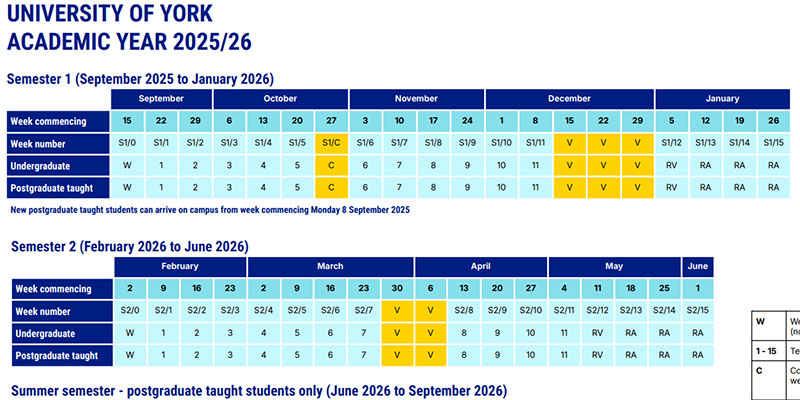Semesters
Semesters guide
Download our semesters poster to plan your teaching, assessment and vacation weeks:

Semester dates 2025/26
Semester 1 (Sep 2025 - Jan 2026)
| Date | Week |
|---|---|
| 8 Sep | Postgraduate welcome activities begin |
| 15 Sep | Freshers week |
| 22 Sep | Teaching week 1 |
| 29 Sep | Teaching week 2 |
| 6 Oct | Teaching week 3 |
| 13 Oct | Teaching week 4 |
| 20 Oct | Teaching week 5 |
| 27 Oct | Consolidation week* |
| 3 Nov | Teaching week 6 |
| 10 Nov | Teaching week 7 |
| 17 Nov | Teaching week 8 |
| 24 Nov | Teaching week 9 |
| 1 Dec | Teaching week 10 |
| 8 Dec | Teaching week 11 |
| 15 Dec | Vacation* |
| 22 Dec | Vacation* |
| 29 Dec | Vacation* |
| 5 Jan | Revision week* |
| 12 Jan | Revision and assessment |
| 19 Jan | Revision and assessment |
| 26 Jan | Revision and assessment |
*Attendance on campus is not compulsory these weeks
Semester 2 (Feb 2026 - Jun 2026)
| Date | Week |
|---|---|
| 2 Feb | Refreshers week |
| 9 Feb | Teaching week 1 |
| 16 Feb | Teaching week 2 |
| 23 Feb | Teaching week 3 |
| 2 Mar | Teaching week 4 |
| 9 Mar | Teaching week 5 |
| 16 Mar | Teaching week 6 |
| 23 Mar | Teaching week 7 |
| 30 Mar | Vacation* |
| 6 Apr | Vacation* |
| 13 Apr | Teaching week 8 |
| 20 Apr | Teaching week 9 |
| 27 Apr | Teaching week 10 |
| 4 May | Teaching week 11 |
| 11 May | Revision week* |
| 18 May | Revision and assessment |
| 25 May | Revision and assessment |
| 1 Jun | Revision and assessment |
*Attendance on campus is not compulsory these weeks
Attendance
You will be expected to be on campus for the 11 Teaching and Learning Weeks each semester and also whilst you are undertaking assessments. It is also highly recommended you attend during Freshers/Refreshers weeks as these contain key orientation events for all students.
You aren’t required to be on campus for the consolidation, vacation or revision weeks but University resources will continue to be available throughout the year.
Taught postgraduate students also have a summer semester and are required to attend over the summer period.
